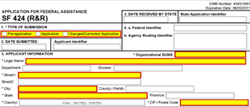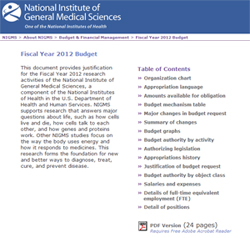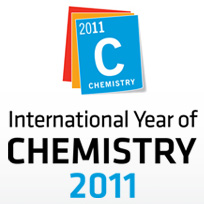 We just reached a milestone—our 100,000th grant application. Interestingly, it’s for a K99/R00 (Pathway to Independence) award. This program enables promising postdoctoral scientists to receive mentored—and later independent—research support. Given our strong commitment to research training, mentoring and workforce development, it’s somehow fitting that this application is for a program that addresses these needs.
We just reached a milestone—our 100,000th grant application. Interestingly, it’s for a K99/R00 (Pathway to Independence) award. This program enables promising postdoctoral scientists to receive mentored—and later independent—research support. Given our strong commitment to research training, mentoring and workforce development, it’s somehow fitting that this application is for a program that addresses these needs.
I remember well when I submitted my first independent grant application, R29GM038230. It was for a FIRST award, an earlier program directed toward helping early stage investigators develop their independent careers. I submitted the application before there was a Grants.gov—and even before there were overnight delivery services. Since I was located in Baltimore, not far from NIH, I personally drove the application down to the old Westwood Building, where the predecessor to the NIH Center for Scientific Review (and NIGMS) was housed at the time. After I presented my carefully wrapped box, I watched as it was thrown on top of a pile of other applications that reminded me of the warehouse scene at the end of “Raiders of the Lost Ark”. Needless to say, I was relieved when I got the self-addressed card indicating that my application had been received and assigned a grant number.
While this is just one small example of how much things can change over time, it leads me to think about other changes and other milestones. One major milestone is coming in 2012, when NIGMS will mark its 50th anniversary. It will be a time for reflecting on the great scientific progress that has been made with NIGMS grant support and also on the opportunities and challenges that lie ahead. You can expect to hear more about the events associated with this anniversary as our plans develop.


 An important step in the annual budget process is the release of the President’s budget request, which happened yesterday. The NIGMS slice is detailed in our FY 2012 budget justification, which includes a budget mechanism table, budget graphs, a Director’s overview and a justification narrative.
An important step in the annual budget process is the release of the President’s budget request, which happened yesterday. The NIGMS slice is detailed in our FY 2012 budget justification, which includes a budget mechanism table, budget graphs, a Director’s overview and a justification narrative. The launch of the International Year of Chemistry 2011 is a good opportunity to reflect on the NIGMS role in supporting research in this central field of science. NIGMS is the leading institute at NIH in funding chemical research, supporting a range of studies focusing on such areas as the development of synthetic methodologies for new drug discovery and synthesis; the role of metals in biological systems; and the discovery of new analytical techniques for the detection, identification and quantification of human metabolites. In fact, just about every branch of chemistry has a connection to the study of human health.
The launch of the International Year of Chemistry 2011 is a good opportunity to reflect on the NIGMS role in supporting research in this central field of science. NIGMS is the leading institute at NIH in funding chemical research, supporting a range of studies focusing on such areas as the development of synthetic methodologies for new drug discovery and synthesis; the role of metals in biological systems; and the discovery of new analytical techniques for the detection, identification and quantification of human metabolites. In fact, just about every branch of chemistry has a connection to the study of human health.